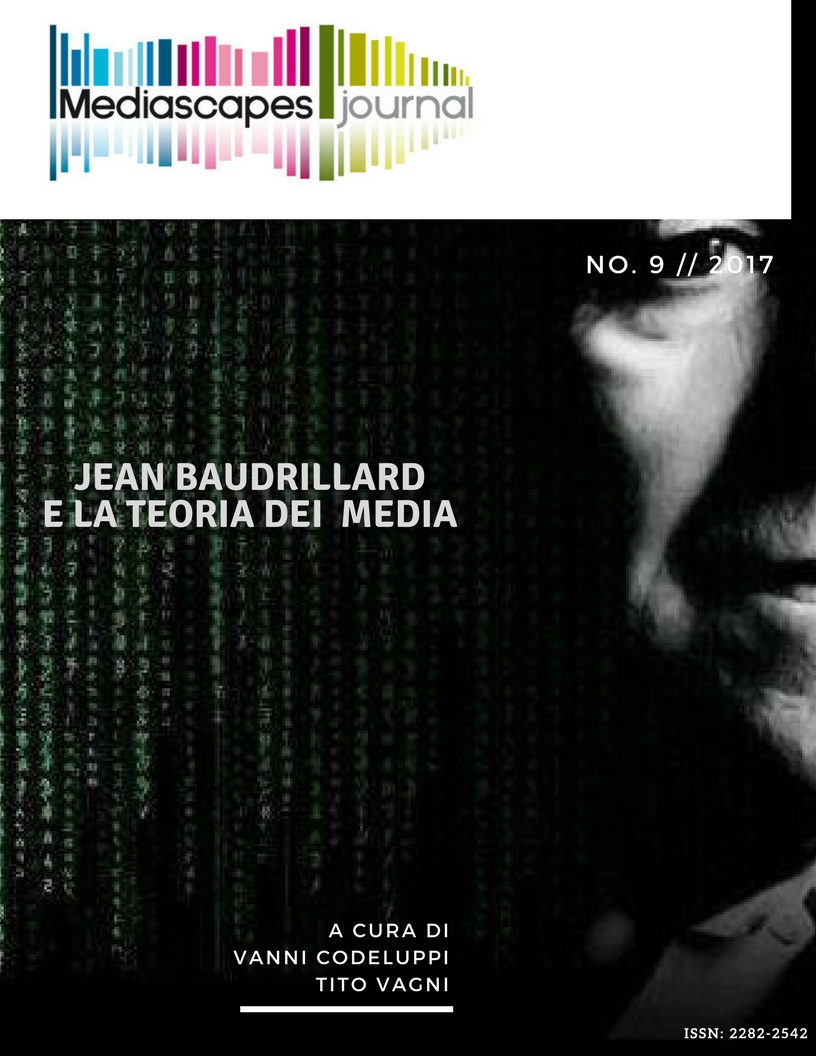La trasparenza dei media e la fine dell’utopia. Jean Baudrillard pensatore utopico
Parole chiave:
Baudrillard, Media, Utopia, Reality, ImagineAbstract
A key to understand the thought of Baudrillard is offered by the concept of Utopia. The use of this concept, never ordinary or random, and its theorizing, also very sophisticated and with a change of meanings over time, are a cornerstone of the entire intellectual journey and an observation point that can illuminate the implications and consequences at the theoretical level. From the beginning until the last works, Baudrillard has continuously developed and designed Utopia in close relationship with its most well-known and important concepts. Will remember, for example, interventions explicitly dedicated to an Utopian theory, even with strategic function against Marxism, appeared in Utopie. Revue de Sociologie de l'Urbain (1967-1978), the journal-collective inspired by Henri Lefebvre. Just as it is to remember the strategic importance of the idea of "utopia achieved" presented in such works as Simulacres et simulation (1981) and America (1986), later to become the instrument of interpretation of contemporary phenomena in the essays of the Nineties and the early years of the 2000.
Within this path, a work like La Transparence du Mal: Essai sur les phenomenes extremes (1990) is an important step. The contemporary world, argues Baudrillard, is the world of an orgy accomplished and of a total liberation implemented in all spheres of social life: productive, sexual, artistic, scientific, communicative. The success of modernity and its materialized principles of an Utopia realized determines the forced repetition of all liberated scenarios, playback of already, the simulation “of ideals, phantasies, images and dreams which are now behind us, yet which we must continue to reproduce in a sort of inescapable indifference”.
The end of Utopia in the figure of its completion is a perfect example of the capacity of the contemporary techno-social system to absorb every instance, also antagonistic, inside as a further element in its recursive operation. In this mechanism, the "semiurgy" implemented by the media system and the cancellation of the content and meaning of the messages in favour of speed and promotion of communication as an end in itself plays a fundamental role. However, at the same time, Baudrillard left open the field of critical thinking to forms of adialettics logic, reversible, seductive, that can be considered as a sort of "secret utopia" of his thinking.
##submission.downloads##
Pubblicato
Come citare
Fascicolo
Sezione
Licenza
Gli autori che pubblicano su questa rivista accettano le seguenti condizioni:
- Gli autori mantengono i diritti sulla loro opera e cedono alla rivista il diritto di prima pubblicazione dell'opera, contemporaneamente licenziata sotto una Licenza Creative Commons - Attribuzione che permette ad altri di condividere l'opera indicando la paternità intellettuale e la prima pubblicazione su questa rivista.
- Gli autori possono aderire ad altri accordi di licenza non esclusiva per la distribuzione della versione dell'opera pubblicata (es. depositarla in un archivio istituzionale o pubblicarla in una monografia), a patto di indicare che la prima pubblicazione è avvenuta su questa rivista.
- Gli autori possono diffondere la loro opera online (es. in repository istituzionali o nel loro sito web) prima e durante il processo di submission, poiché può portare a scambi produttivi e aumentare le citazioni dell'opera pubblicata (Vedi The Effect of Open Access).


